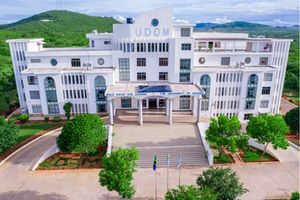Carbon Tanzania reveals impressive social impact and environmental success in 2023

What you need to know:
- $6.9 million revenue for Tanzanian forest communities through carbon market participation - an increase of over 50% from 2022
- 690,500 hectares of forest protected - double the size of Luxembourg
- 899,825 tons of CO2 reduced from Carbon Tanzania’s forest protection projects - equivalent of taking almost 200,000 cars off the road for a year
- By using a new social value tool in the Yaeda Valley project to understand how people experience the impact of carbon revenue, a Social Return on Investment of $25 for every $1 invested was measured.
Carbon Tanzania, a pioneering force in the protection of forests and carbon finance, has released its latest Impact Report for the year 2023, showcasing significant progress in both social and environmental areas.
In a year marked by impressive growth and impact, Carbon Tanzania has channeled over $6.9 million USD in revenue to forest communities through the voluntary carbon market.
This revenue has empowered remote communities to manage their forest resources sustainably and invest in health, education, and critical security infrastructure for their people - resulting in the protection of habitat for some of Africa’s most iconic wildlife.
The impact on Tanzania's biodiversity was equally impressive, with Carbon Tanzania projects in Yaeda-Eyasi, Makame and Ntakata protecting wildlife-rich forest habitat twice the size of Luxembourg, totaling 690,500 hectares. This preservation effort resulted in a reduction of 899,825 tonnes of CO2 emissions, equivalent to removing almost 200,000 cars from the road for a year.
Exploring the social impact of forest conservation efforts
Underscoring its continued commitment to measuring social value, Carbon Tanzania conducted an extensive social impact assessment in the Yaeda Valley which sought to gain a detailed understanding of the social value of carbon revenue on the community.

Employing the rigorous Social Return on Investment (SROI) approach, the assessment meticulously scrutinized the myriad ways in which carbon revenue translated into measurable social outcomes.
The findings revealed a Net Present Value (value of the benefits relative to the costs of achieving those benefits) of over $8.6 million USD in social outcomes generated from carbon revenue.
With a Social Return on Investment of $25 for every $1 invested, alongside tangible benefits such as enhanced agriculture and livestock conditions, motivating continued community forest protection. Level’s social value tool will be deployed to measure social impact for Carbon Tanzania’s other projects during 2024.
Commenting on the report, Marc Baker, Co-founder and CEO, Carbon Tanzania emphasized the organization's holistic approach to conservation: "Our work extends beyond protecting forests; it's about empowering communities, preserving biodiversity, and mitigating climate change. We believe that only by listening to and amplifying Indigenous voices and measuring social returns can we lay the foundation for an economic system that genuinely values the environment.”
Carbon Tanzania's 2023 project highlights: empowering women and enhancing conservation
Carbon Tanzania's projects in 2023 include the training and recruitment of five women in the Makame Savannah as Village Game Scouts which not only challenged gender stereotypes but also promoted inclusive conservation efforts.
In the Ntakata Mountains, revenue generated by carbon initiatives facilitated loans for 189 women, enabling them to establish conservation-aligned businesses. This initiative directly tackled historical barriers to financial access for women in the region.
And in the Ruvuma Wilderness, project managers underwent training on a cutting-edge app tailored to community-led project activities - Cluey - enhancing local knowledge and project efficiency.

About Carbon Tanzania
Carbon Tanzania is a local company that creates value in natural resources for rural communities through the sustainable management of forests and biodiversity.
We generate value for Tanzania’s economy and its people by producing nature-based carbon credits that enable local people to earn revenues from the protection of their landscapes.
These verified emissions reductions allow global businesses with credible decarbonisation and nature-positive strategies to invest in a locally produced nature-based solution that serves the climate, communities and wildlife.
Why Carbon Tanzania
Credibility
Carbon Tanzania is a trustworthy and reliable partner supporting the positioning of Tanzania as a global leader in forest protection as well as enabling access to international climate finance and bringing huge benefits for local citizens.
Delivering value
We deliver regular, reliable financial flows to local communities, stimulating rural economies and through that the national economy.

Resource protection
We provide the link to the global financial system through the certification of carbon credits that enables local communities to earn revenues from the protection of their natural resources. Now instead of bearing the cost of conservation, they are benefiting from a commitment to manage and conserve it.
Local communities
Local people are the most effective stewards of nature. When they have reliable, secure rights over their natural resources and receive appropriate compensation for their efforts to protect and manage them, powerful results in climate action are possible.
Measurable benefits
Forest conservation is one of the most cost-effective ways to mitigate climate change, and conserving forests brings about positive and measurable economic, social and environmental benefits to local communities. Carbon credits prevent trees from being cut down, protect wildlife and benefit people.


